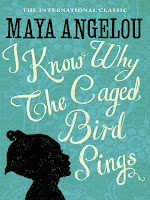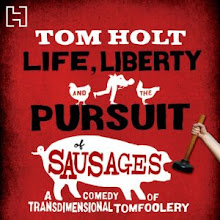 Synopsis: When Charles Arrowby retires from his glittering career in the London theatre, he buys a remote house on the rocks by the sea. He hopes to escape from his tumultuous love affairs but unexpectedly bumps into his childhood sweetheart and sets his heart on destroying her marriage. His equilibrium is further disturbed when his friends all decide to come and keep him company and Charles finds his seaside idyll severely threatened by his obsessions.Review:
Synopsis: When Charles Arrowby retires from his glittering career in the London theatre, he buys a remote house on the rocks by the sea. He hopes to escape from his tumultuous love affairs but unexpectedly bumps into his childhood sweetheart and sets his heart on destroying her marriage. His equilibrium is further disturbed when his friends all decide to come and keep him company and Charles finds his seaside idyll severely threatened by his obsessions.Review: I really enjoyed this book, it's beautifully atmospheric and lyrical. I think it's probably going to set me off on an Iris Murdoch obsession .. in fact it already has ... whilst reading it I also managed to fit in Iris's only short story
Something Special and am currently reading her husband John Bayley's beautiful
Iris memoirs, I've also recently bought
The Black Prince so she's becoming a bit of a project. The central character of
The Sea, The Sea is Charles Arrowby, an ageing theatrical celebrity, and it has to be said he's completely unlikeable, although my opinion of him shifted quite a bit during the story I never found myself liking him at any point. At the start of the story you find yourself fairly in tune with him .. you can understand why anyone would want to take themselves off to a remote location by the sea to commune with nature and get away from it all .. Charles's wish is to find himself somewhere where he has nothing else to do but
'learn to be good' and this seems admirable, perhaps he is tired of the adulation and fame and yearns for the simple life. He has plans to write a diary/journal/autobiography .. perhaps novel .. he can never quite pin it down and changes his mind constantly. Perhaps it's just as well that I started the novel by being fairly well disposed towards him because he soon tests that to the limit.
The house that Charles buys is called 'Shruff End', it perches on a small promontory and is exposed, isolated, damp and possibly haunted. The locals are fairly hostile, they seem less than impressed with their new celebrity neighbour and the sea (very much a central character in the book) and it's environs also turn out to be unpredictable and unaccommodating. Charles is spooked by all sorts of imaginary faces at windows and bumps in the night and things come to a bit of a head when whilst sitting with his notebook staring out to see he momentarily see's a monster rising from the waves. Are these things just hallucinations or are they portents of things to come?
'I can describe this in no other way. Out of a perfectly calm empty sea, at a distance of perhaos a quarter of a mile (or less), I saw an immense creature break the surface and arch itself upward. At first it looked like a black snake, then a long thickening body with a ridgy spiny back followed the elongated neck. There was something which might have been a flipper or perhaps a fin. I could not see the whole of the creature, but the remainder of it's body, or perhaps a long tail, disturbed the foaming water round the base of what had now risen from the sea to a height of (as it seemed) twenty or thirty feet. The creature then coiled itself so that the long neck circled twice, bringing the now conspicuous head low down above the surface of the sea. I could see the sky through the coils. I could also see the head with remarkable clarity, a kind of crested snake's head, green eyed, the mouth opening to show teeth and a pink interior. The head and neck glistened with a blue sheen. Then in a moment the whole thing collapsed, the coils fell, the undulating back still broke the water, and then there was nothing but a great foaming swirling pool where the creature had vanished.'
He find himself and his cottage besieged by many of the people he has sought to leave behind, old love rivals, relations, friends and enemies turn up at his door, these people seem to both love and loathe him at the same time and it's through them that we start to see Charles's true character emerge and instead of
'learning to be good' he carries on being bad. This is a man who is far more used to manipulating and exploiting people than we were at first led to believe. His staggering conceit and lack of regard for the feelings of others really comes to a head when he bumps into Hartley, an old flame who he was once engaged to marry. Hartley was the one true love of his life and he has never really came to terms with losing her. They were very young when first together and seemingly devoted to each other when Hartley was suddenly whisked away by her family never to be seen again by Charles ... until now. It turns out that Hartley lives just a short way from 'Shruff End', she's an ordinary, rather unattractive and elderly housewife now but that doesn't matter to Charles. He see's her very much as she once was and is convinced that she needs rescuing from her rather brutish husband, Ben. This sets him on a course of actions which can only be described as bizarre, obsessive and self deluded. He thinks his intentions are honourable and finds constant excuses for his selfish behaviour. It is at times extremely uncomfortable to read about Charles's treatment of poor Hartley even though you do find yourself thinking frequently 'get a grip woman for goodness sake' but it's also fairly farcical too (you're constantly cringing and hoping that something happens to thwart his plans and scheme.) It's only in the aftermath of these disastrous encounters with Hartley that Charles really begins to assess his own true character.
Perhaps one of the most interesting secondary characters is James, Charles's cousin and rival. Charles has never liked or understood him, there's a fair amount of jealousy and suspicion going right back to childhood. Though his character is perhaps only lightly touched upon I found myself drawn to him and wanting to know more and much of the mystery and magic which weaves it's way through the tale is wrapped up in his story.I also really liked the descriptions of the bizarre meals that Charles enjoyed concocting, it added an amusing and quirky touch .. I've since found out that they mostly came from the suggestions of Iris's husband John.
The book is perhaps overlong, I felt at times I had got to the end when I hadn't quite and occasionally the story wandered too far and I found my interest lagging but on the whole I found it mesmerising, strange and quite unlike anything I'd read before. It's a story that's open to many interpretations and probably nearly every reader will take something different from it.
 Apparently the British are no longer a nation of marmalade eaters!! There has been a steady decline in sales over the past few years, not because we're busy making it ourselves but because we've acquired a love for chocolate spread and peanut butter!! Now, I like both of those two in moderation but not for breakfast, it's unthinkable.
Apparently the British are no longer a nation of marmalade eaters!! There has been a steady decline in sales over the past few years, not because we're busy making it ourselves but because we've acquired a love for chocolate spread and peanut butter!! Now, I like both of those two in moderation but not for breakfast, it's unthinkable. We should all take a leaf out of Paddington Bear's book. He's 53 this year and doesn't look a day older than when he first came hot trotting it here from darkest Peru and the reason of course is all down to his diet of marmalade sandwiches.
We should all take a leaf out of Paddington Bear's book. He's 53 this year and doesn't look a day older than when he first came hot trotting it here from darkest Peru and the reason of course is all down to his diet of marmalade sandwiches. The combination of reading this sad news and seeing the rather terrifying knobbly Seville oranges for sale in the supermarkets decided me on making some marmalade. It's not very difficult, but you do need a fair amount of patience (something I'm unfortunately short of) and a good memory (don't lick your fingers after squeezing the oranges .. they're mouth puckeringly bitter.) As usual, and similarly with jam, setting point can be a bit elusive, I must have tested for a set at least five times and in the end I thought that'll do and it was fine.
The combination of reading this sad news and seeing the rather terrifying knobbly Seville oranges for sale in the supermarkets decided me on making some marmalade. It's not very difficult, but you do need a fair amount of patience (something I'm unfortunately short of) and a good memory (don't lick your fingers after squeezing the oranges .. they're mouth puckeringly bitter.) As usual, and similarly with jam, setting point can be a bit elusive, I must have tested for a set at least five times and in the end I thought that'll do and it was fine.









 I love David Roberts's drawings, they help make the books special .. I'm not keen on the new covers which have different artwork and no inside illustrations. I guess they are supposed to be the 'adult' covers .. I'm sticking with the children's one's, they're quirky, creepy and absolutely perfect.
I love David Roberts's drawings, they help make the books special .. I'm not keen on the new covers which have different artwork and no inside illustrations. I guess they are supposed to be the 'adult' covers .. I'm sticking with the children's one's, they're quirky, creepy and absolutely perfect.






